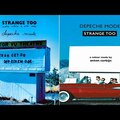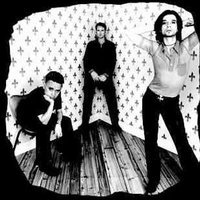When synth-pop trailblazers Depeche Mode put out their darkly hued seventh album, Violator, a quarter of a century ago, it was an event. The Beatles may have had Beatlemania, but the group had their own bloodthirsty zombie horde willing to crush anything standing between them and their favorite band. One day after the record came out, a mob of more than 10,000 fans shut down a small section of Los Angeles surrounding a record store where the group was doing a signing. The Depeche Mode faithful pushed on the shop's windows so forcefully that the glass wobbled and ultimately cost the city some $25,000 to disperse 130 policemen in riot gear to subdue the band's unruly disciples.
Thanks to a string of hypnotizing, sexually charged singles – the cheekily gothic "Personal Jesus," sensually serene "Enjoy the Silence," otherworldly and bluesy "Policy of Truth" – the record quickly became the band's best-selling LP, reaching Number Seven on Billboard and going triple platinum. But aside from its commercial success, the LP signaled a new era for the band: In less than a decade, they'd gone from swiveling their butts to their new-wave gem "Just Can't Get Enough" to creating the brooding, cinematic and mysterious post-goth masterpieces of Violator. Why does singer Dave Gahan sound so fragile yet hopeful on "Waiting for Tonight"? How can "Blue Dress" come off so beautiful yet creepy? What is the underlying message to their Pink Floyd riffing on "Clean"? The record's enduring mysteries echo today in the number of times artists ranging from Marilyn Manson to Susan Boyle have covered Violator's songs.
The band's Martin Gore, who wrote every song on the album and played its minimalistic and snaky guitar lines, fondly remembers the fun surrounding the making of the record. "During that time in our career, we were quite experimental in our choices of recording locations, and we loved the idea of going off and making each album an adventure," he tells Rolling Stone, looking back at the record after discussing his upcoming MG solo LP for an upcoming article. "We recorded the majority of Violator in Milan, which was really good fun. How we got anything done, I don't know because we were out partying most nights."
When the band wasn't in Milan, they recorded in New York, London and Gjerlev, Denmark, with co-producer Flood. "When we were in Denmark, it was kind of in the middle of nowhere," Gore says. "The nearest town was, like, a 20-minute ride away and it was a really tiny town. We finished and mixed the record there."
Overall, he recalls Violator with great affection, if only for the place it holds in the band's personal history. "When the four members of the band were still together, Violator was the pinnacle of us having fun, I think," he says, referring to Alan Wilder's departure from the band in 1995. "By the time we got to [1993's] Songs of Faith and Devotion, things had gotten derailed and people had changed. It was much more of a struggle to make. Even though I think it's a great album, up there with all of our favorites, it was just a different vibe."
Reflecting on the many different cover versions of Violator songs that have come out over the past quarter century, Gore settles on Johnny Cash's stark, acoustic take on "Personal Jesus" as his favorite. "It's the most different," he says. "It's just got that Johnny Cash spiritual quality to it, that magic. And for it to be on his last album before he passed was something very special."
"Personal Jesus" – a song that's obliquely about the Man in Black's friend Elvis Presley since it was inspired by Priscilla Presley's deity-like depiction of the King in her book Elvis & Me – is the song musicians ask to cover most often. In addition to Cash, artists from Sammy Hagar to industro-rockers Gravity Kills have put their own spin on it. "The majority of them, I have to say, I don't particularly like," Gore says. "But I usually approve them, because they're my fans. Nobody's going to want to cover that unless they're actually a fan. And to say, 'No, you can't release that because I don't like it,' is a bit unfair. I get tons of stuff coming in from, like, Germany and Eastern Europe, people singing in really bad accents but I always approve them." He laughs.
"The thing I'm most proud of is the fact that we seem to have influenced people right across the board in all different genres of music," he says. "Metal bands and Susan Boyle." He laughs again.




